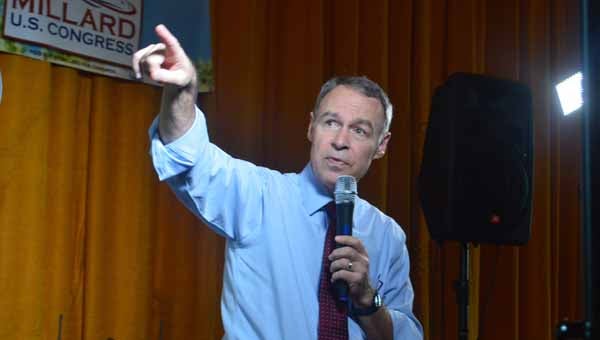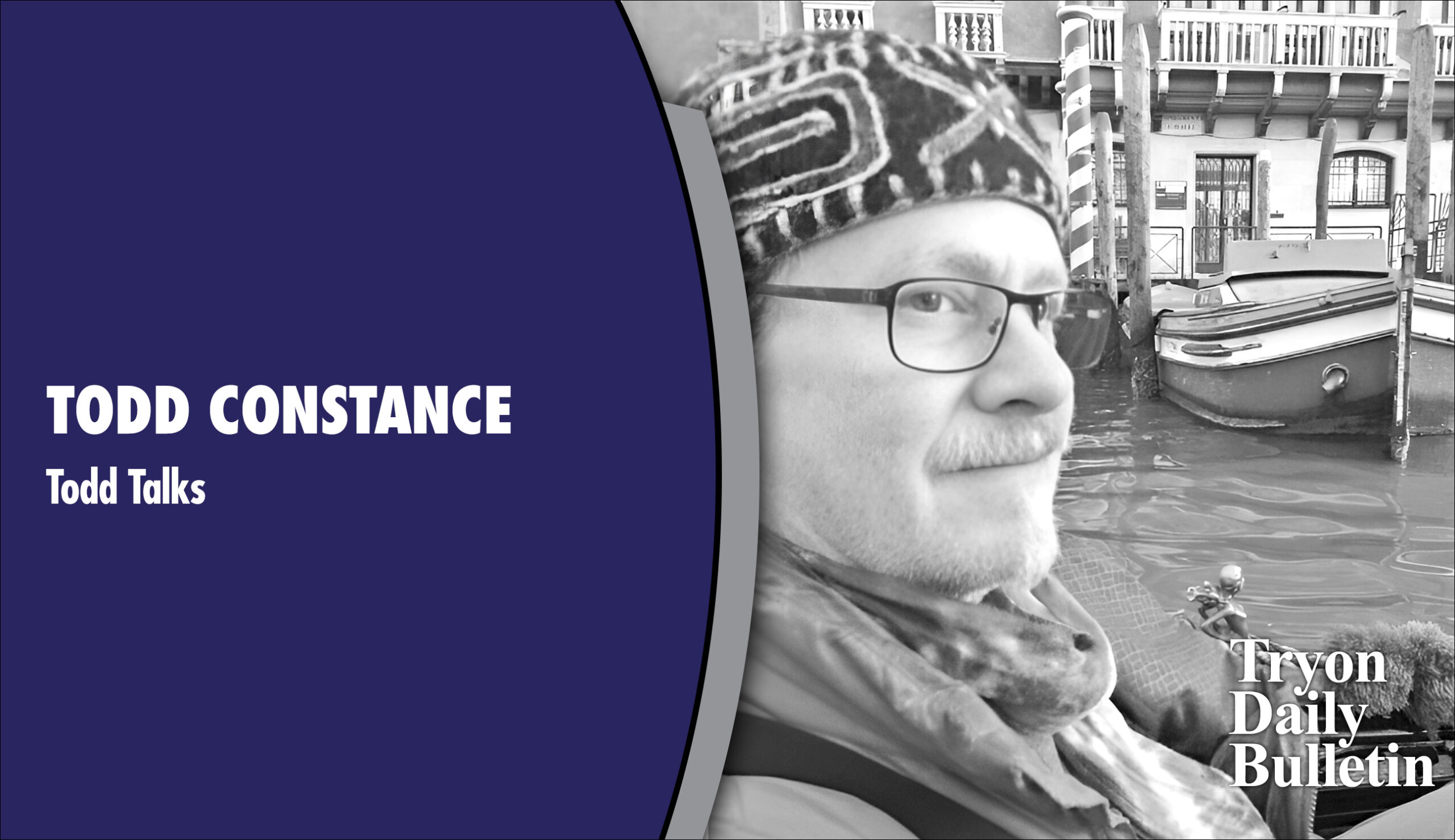Congressional candidate Millard holds town hall meeting at Mill Spring Ag Center
Published 3:47 pm Friday, August 12, 2016

Andy Millard, candidate in North Carolina’s 10th District Congressional race, held a town hall meeting at the Mill Spring Agriculture Center Thursday evening to discuss hot button issues with community residents of Polk County. These issues included climate change, education, gun safety, healthcare, immigration, globalization, the prison system and infrastructure in WNC. (Photo by Michael O’Hearn)
MILL SPRING – Democratic candidate for North Carolina’s 10th Congressional District Andy Millard held a town hall meeting and welcomed a crowd of approximately 30 to the auditorium at the Mill Spring Agriculture Center Thursday evening, Aug. 11.
A tally board was set up to determine the audience’s most important issues or concerns. Attendees then voiced their concerns or questions on a number of topics. Millard listened and offered responses afterwards.
Millard said he has been listening to the constituents in the district for more than a year leading up to the town hall meeting, and said he wanted to focus on the core issues that needed to be brought forth in Congress.
Trending
On campaign finance reform
One attendee, an owner of a trucking company that transports blades for wind turbines, explained to Millard that he felt the absolute central issue is the money that comes into Congress from big corporations.
“There are very few up there, there may be one or two good people, who give a damn about my small business,” the resident said, referring to representatives in Congress. “All they are after are the big suitcases of money. They hide behind this curtain of self-righteousness and say there’s no corruption but it’s everywhere. Once you fix that, everything else will be put into place.”
On poverty in Polk County
Another attendee from Mill Spring took the microphone to address Millard about the level of poverty in Polk County, saying jobs and economic growth affect children and their families especially.
“I think the biggest problem in this county is the level of poverty,” the attendee said. “I think jobs and economic improvements will help that, but I think it’s easy if you’re not living in poverty to overlook those who are, and that especially affects children with their education, families, knowing where they will get their next meal from and having a safe place to live.”
Trending
Gun safety and mental health issues
On gun safety, one attendee said she would like the Center for Disease Control to be able to use gun safety as a platform for talking about mental health.
“I would like the CDC to use it as a health issue and to do research on it. I think it’s really important to know really what the issues are on gun safety,” the attendee said. “I know the government has some funding for it from the Children’s Defense Fund, but it’s really important.”
Millard responded by saying gun safety is a health issue, adding that it is a matter of public health. Penny Padgett, Polk County commissioner candidate, stood to add to the gun safety point, saying the Congress has prevented the CDC from investigating gun safety as a health issue.
On healthcare
Another attendee stood to address her concerns about the medical industry and expenses being abnormally high because of Obamacare.
“What concerns me is that it seems to me the cost of certain medicines are just enormously high right now,” the speaker said. “I don’t know if it’s Obamacare or the pharmaceutical companies but it’s just something that concerns me.”
Millard asked the audience if they have seen their healthcare expenses go up or down, and who has healthcare now since Obamacare went into effect. Millard said he felt there are a lot of good things in the Affordable Care Act but there are some issues that need to be addressed.
“That is one of the things that I have been wrestling with as an issue and it has brought a lot of good things,” Millard said. “How many people are paying more and how much of that is because of the Affordable Care Act? How much of that is what might have been the case anyway? We can’t just declare victory and say that it is something we’re all fine with.”
On the national debt
National debt and “fiscal cliffs” were two issues raised by another speaker.
“We have a lot of beautiful cliffs here, but nationally we have these fiscal cliffs and a national debt and I would say most of us in this room need social security,” the attendee said. “It’s not as complicated as we’ve been hearing. AARP puts out a template and one solution. That’s the low hanging fruit and it’s something that, regardless of party affiliation, I think everyone’s got a constituency that significantly relies on social security. It’s something that we should solve now before we wait until it falls off the cliff.”
Millard said this is a problem that needs to be solved for the next generation, adding that he does not yet need social security.
“It should be bipartisan and, for me, for the next generation and the people who are a couple of generations younger than me, absolutely,” Millard said.
On the defense budget
John Dean, a Saluda resident, brought up the deficit and what he felt was an endless war cycle and a huge defense budget.
“It’s gotten so out of control, and we’ve become numb to it and don’t realize we’re sending people over to get killed,” the Saluda resident said. “We also need to know our place in the world before we begin engaging in war. It has become so out of control and so endless.”
Millard responded by saying, “It’s not just dollars that we spend to send men and women into war. It’s a cost to the generation that has gone. It’s also the emotional cost. I just learned this a couple days ago, but in 2014, the most recent year we can get our statistics, 20 veterans a day kill themselves. That is the cost that I can assure you I will take to my heart and my mind before I vote to send somebody overseas to risk their lives.”
International trade and inequality
International trade and a global market were issues brought up next by an attendee.
“We are a global market when it comes to international trade and many politicians want to deny that, and it impossible to do so,” the attendee said. “To dismiss world trade is unthinkable at this day and time. I want some attention to our world trade.”
On incarceration rates
Penny Padgett stood to voice her issues with education, poverty and the high costs of incarceration.
“One of the problems that I have seen over and over again when it comes to criminal justice is how expensive it is to incarcerate and keep incarcerating anyone,” Padgett said. “A year in jail costs the equivalent of four years in a private college. The prison system is very expensive, and I’m not saying we should do away with it. Education programs like after school programs and preschool programs, programs that are aimed at keeping kids in school and out of trouble, are often the easiest things to miss.”
Millard said, as a professional investor, investing money in one area will lead him to expect a return over time. Investing money “on the front end” with kids will help save money in this instance, according to Millard.
On immigration
Another attendee who had been to incumbent Rep. Patrick McHenry’s town hall meeting the previous night in Columbus and had asked McHenry’s stance on immigration, also asked Millard about his thoughts on immigration.
“I prefaced the question by saying that immigration is at its lowest level today in the United States since 1973,” the attendee explained. “His answer seemed to say he was going to spend more money to build a wall and secure our border. I would like to know your thoughts on this perceived immigration problem.”
Millard stated that he is not interested in building walls to secure the border.
On the privatization of government services
Dr. Faith Weathington from Gardner-Webb University brought up the privatization of social security and other government services.
“I’m concerned about, in many areas, privatization is occurring with many services the government is providing,” Weathington said. “There’s a whole host of things, and every area that we’ve seen privatization in we’ve seen failures and we’ve seen difficulties and we see inequalities are increasing in America.”
On higher education
Aptitude tests and the perception that higher education is becoming a business was an issue brought up by a Columbus resident next.
“Higher education seems to be becoming more of a business than anything else,” the Columbus resident said. “More work needs to be done, and very early on, with a child to identify his skills and find a program that would suit his talents. I was pushed into something I didn’t think I would be very good at, electronics, through tests. We need to work on our education system rather than say free college for everyone, because not everyone needs to go to college full-time.”
Millard posed the question of free community college to the Columbus resident, to which the resident said the notion would be good because he himself started in a community college.
“I think that was a great stepping stone for me, because I got my associate degree and then my bachelor’s and then my master’s and I kept going on,” the Columbus resident said. “It is a key stepping stone for people who may not be able to get an associate degree and can go to a vocational school, to take their talents and direct them to something that is good for the economy, allows them to get a job and be productive.”
Millard on his top issues
A final tally of the night’s top issues was taken near the close of the meeting. Corporate campaign finance had 32 votes, followed by clean energy and climate at 29 votes and the defense budget at 24 votes.
“My number one concern is jobs and economic development in the 10th Congressional District,” Millard said. “I believe, as I said at the top, economic development and climate and environment go together. We’ve been sold this false choice between taking care of the environment and jobs. I don’t think it’s a choice.”
Millard continued on the topic of globalization by saying, “With the people in our district, they have sacrificed their own personal prosperity for the sake of globalization. Globalization is here to stay, it is, and we can’t go back because that’s not the way we do things. We go forward, and sometimes we don’t even want to go forward, but there’s no choice. It’s time we invested in the 10th Congressional District to bring more opportunity to folks here in the 10th Congressional District.”
Investments would include infrastructure like bridges, roads and even Wi-Fi, according to Millard.
“Gridlock, campaign reform is a huge problem, we mentioned globalization and I am dead set against privatizing social security, veterans’ benefits and a lot of other programs,” Millard said. “Fiscal responsibility is big to me, and I do believe that the national debt is a big issue and the interest on the national debt in seven years is the third highest expenditure for our national government. We need to learn to invest here in North Carolina.”
Millard on being effective in Congress
Walt Fletcher, who said he has known Millard for almost 25 years, asked Millard how he will be an effective force in Congress.
“If you can make a change, God bless you and we will hate to lose you as a full-time Polk County resident,” Fletcher said to Millard. “You have told me that you are going to make a change. I’m concerned about how you are going to be an effective force in the Congress of the United States.”
“I’m not just one guy, I’m your guy,” Millard responded. “I don’t need the job and we have so many people up there who are more interested in keeping the job than doing the job. I’m the opposite because I don’t want to lose being a full-time resident of Polk County either and I’m ready to come back when I can. I don’t have a complete answer to that question. Whatever I can do, that will be done.”





